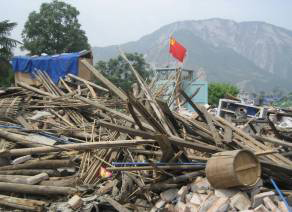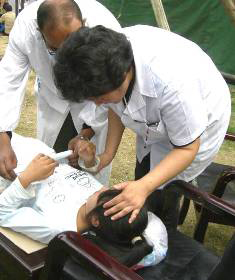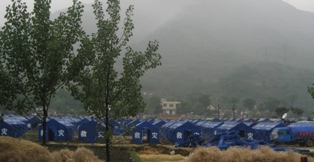When disaster strikes, researchers react
May - June, 2008 | Volume 7, Issue 3
Even in stable conditions, research, training and health care delivery are difficult in some of the remote places Fogarty-sponsored scientists work. But what happens to their ability to conduct research and improve the health of some of the world's most vulnerable people when either natural or political earthquakes topple cities and threaten individual or public health?
The question has taken on grim meaning in recent years with the Asian tsunami of 2004, strife in Zimbabwe and South Asia and, more particularly, in the aftermath of the 7.9 magnitude earthquake beneath Sichuan, China, May 12, 2008 that killed at least 70,000 people. Here and in the associated stories (links below), personal accounts are reported that may help future researchers in times of crisis.

Photo: Ma Hong
As many as 19 current and former Fogarty trainees were in the field or positions of leadership in the Ministry of Health when the disaster mobilization began. They operated under three programs with Fogarty partners - Harvard University, and University of Rochester and UCLA.
"The earthquake response demonstrates that the value Fogarty has added to global health in our 40 years is not just in aiding victims of a catastrophe or preventing the outbreak of disease, but also in building the capacity of other countries - big or small - to tackle public health crises on their own," says Fogarty Director Dr. Roger I. Glass.
The Chinese mental health team that responded to the disaster was led by Dr. Yu Xin, director of the Beijing Institute for Mental Health and co-director of the Fogarty program with Harvard Medical School; Dr. Ma Hong, the chief of mental health for China's Center for Disease Control; and Dr. Liu Jin, who will be a fellow at Harvard next year.
Yu organized experts from both psychiatry and psychology to draft guidelines for post-disaster mental health services, targeting the injured, the children, the first-aid teams and the displaced. He and Dr. Wu Zunyou, a former Fogarty trainee and now head of the Chinese Center for Disease Control's AIDS and STD control, reported the monumental efforts of young doctors who had been trained under Fogarty programs.

Photo: Li Weihui
Dr. Ma Hong, the chief of mental
health for China's Center for
Disease Control and a former
Fogarty fellow, (right), attends to
a girl whose sister was lost in the
earthquake.
Prof. Byron Good, the principal investigator from Harvard University Medical School's Training Program in International Mental Health, says, "With Fogarty's support we are developing a network of new leaders of China's mental health system, and they have all stepped up on this occasion."
Perhaps the key figure in the field was Ma, who had just returned from two months of advanced training at Harvard.
Immediately, she went to Sichuan with four other psychiatrists and, working with UNICEF, set up first-aid for psychologically traumatized victims in Mianyang, the largest city in the earthquake zone. She also trained local psychiatrists, advised local government officials and used the mass media to disseminate mental health information and advocate for more help.
She set up a program called Hope China, organizing more than 200 volunteers to provide mental health first-aid and established aid stations in three refugee camps still housing up to 20,000 earthquake victims.
Fogarty grantee Dr. Eric Caine of the University of Rochester suicide-prevention program reported that trainee Qui Peiyuan had been doing a dissertation on the mental health of migrant workers in the earthquake region only to find that her cohort had disappeared - because either the subjects returned to their homes or they found no work. In addition, a cousin of her husband was killed in the quake.
Dr. Xiao Zeping, another Fogarty collaborator, played a key role as director of the Shanghai Mental Health Center, working with former Fogarty fellows Dr. Qiu Jianyin, Dr. Xie Bin and Dr. Cheng Wenhong.
Although no one's academic work was lost and none of the fellows was injured, their routine was "vigorously impacted" by the earthquake, said Yu, "either because the fellows went to the earthquake sites or they switched to disaster-related work."
Dispatched from Beijing and Shanghai, they wrote a manual on crisis intervention for use by local public health authorities, translated a first-aid guide for on-site responders, prepared a handbook answering 100 questions for survivors and provided both child and adult psychiatric services in Sichuan.

Photo: Ma Hong
There were several important lessons learned, Yu said.
First, fellows perceived their work as not limited to medical services and took into account the psychological needs of the earthquake victims from the particular geographic, cultural and social context."
Second, while realizing the necessity of multidisciplinary teams, careful management is needed in teams consisting of both psychologists and psychiatrists.
Third, says Yu, "We were aware of the importance of the scientific evidence. After the earthquake, hundreds of articles, booklets, manuals, journals, books and e-mails were received with information covering all previous disaster interventions, all with different approaches. The classification, analysis and judgment of those incoming materials are essential to provide scientifically sound information."
Finally, he says, the Fogarty fellows, unlike some of the first responders, knew not to collect so much data that the survivors suffered a "second trauma." According to Yu, "The fellows are always putting the benefits and interests of the earthquake victims first, and all data collection was based on the informed consent and well-established relationship.
The earthquake response demonstrates the value of investing in local research capacity, says Fogarty Director of International Training and Research Dr. Ken Bridbord. "It's a network of people who support one another in a variety of ways. As in the rest of the scientific enterprise, emergencies are about people not dollars."
To view Adobe PDF files,
download current, free accessible plug-ins from Adobe's website.